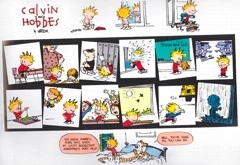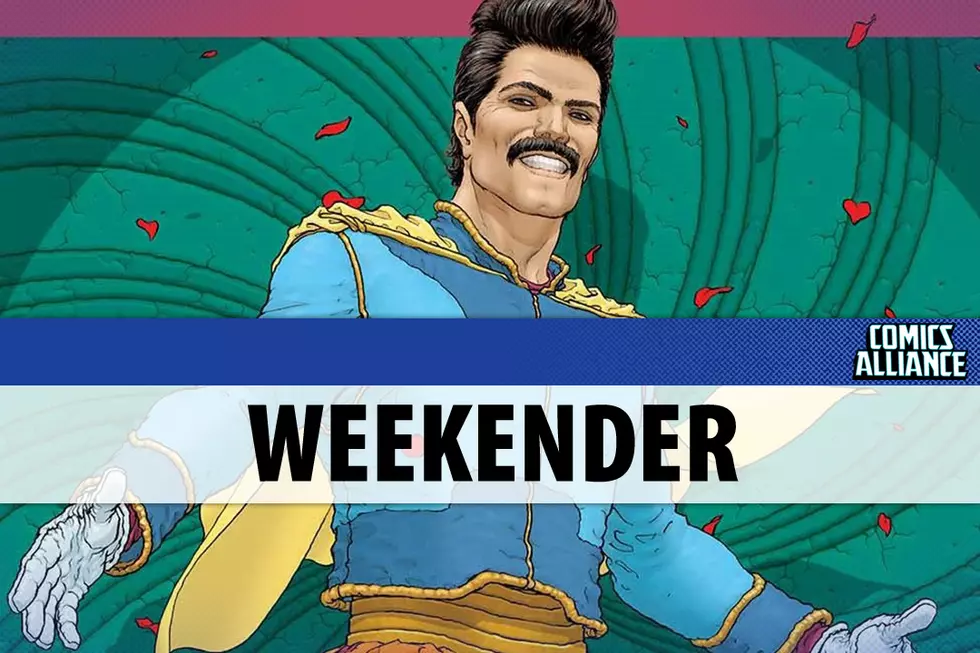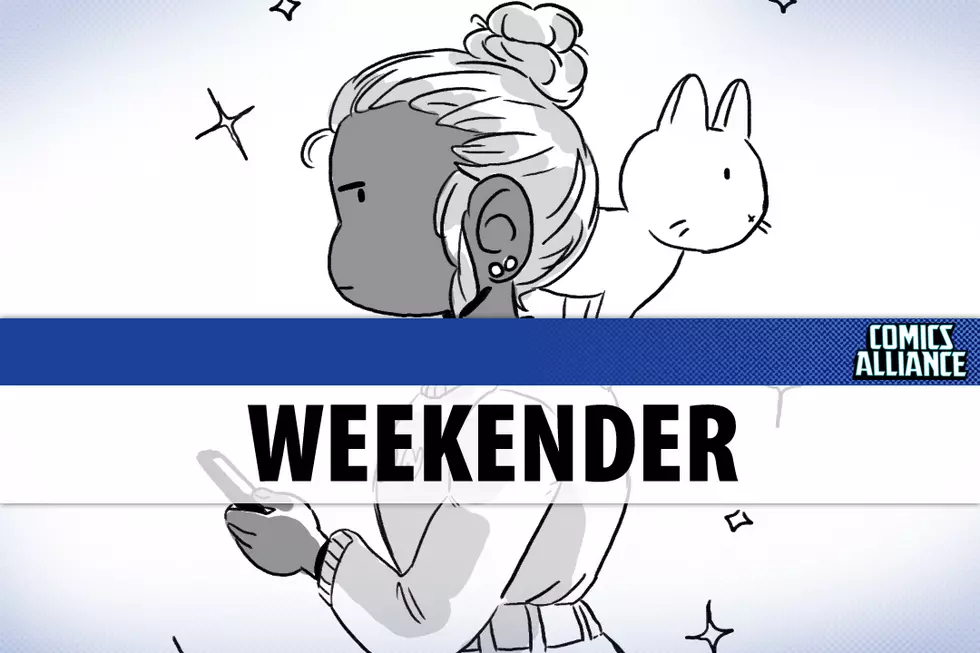
Randall Munroe On His First Book, ‘xkcd: Volume Zero’
 If you don't know what "xkcd" is, then welcome to the internet; you must be new. The spectacularly popular strip about "romance, sarcasm, math and language, quite simply dominates the world of webcomics, scoring up to 70 million page views in a month.
If you don't know what "xkcd" is, then welcome to the internet; you must be new. The spectacularly popular strip about "romance, sarcasm, math and language, quite simply dominates the world of webcomics, scoring up to 70 million page views in a month.
The stick figure strip just released its first print edition, "xkcd: Volume Zero," through a web company called breadpig, and its 24-year-old creator, Randall Munroe, talked with ComicsAlliance about why he bucked the book publishing system, how "xkcd" fits in the minimalist tradition of comics, and why raptors are heartless, horrifying killing machines.
ComicsAlliance: One of my favorite fun facts about you is that you used to work at NASA. Is that as as cool as I've imagined it to be in my head?
Randall Munroe: I think it depends quite a lot on where you are. I've heard wildly different stories from people who worked at NASA centers that are nearer to cities with a geeky vibe, but I was down in southern Virginia. It was basically an internship that bloomed into a paying job; I worked for a summer program, and while I was there I met a guy who was working on robotics, and I got in an argument with him about evolution. Later on I e-mailed him the citations, and he e-mailed back and said, "Great to hear from you! Hey, what are you up to? We've got a spot in our lab." So I worked there for the better part of 2006. Where I was, the people were really nice, but it's wasn't geek culture. It was people who do engineering as a job, working on blueprints for 8 hours a day. Big tiled hallways, industrial design.
CA: At what point in all this did you start doing "xkcd"?
RM: I have to sort reconstruct a timeline, because it's hard to keep track of the years. I had scanned all of these little drawings I'd done, and around September 2005 I started putting them up on the internet one at a time. I got most of my readers from Boing Boing, and that was kinda cool, so I put up more – a drawing a week, three times a week. I stopped when school let out for winter, but when I got back to school in January 2006 I started drawing again, and I've kept my update schedule ever since then. I started to get more of readership that April – that's really when the climb started. By August, I was selling the shirts, and every time I went in to work I was losing money. That's when I decided it might be a good idea to stay home and work on my internet job.
CA: How do you like working from home?
RM: It's one of the coolest jobs I've ever had, but really in the last month or so I've been trying to figure out how to function with this type of job. In high school I had terrible grades, and they were always trying to get me on a schedule, but when I got to college and could work whenever I wanted, my grades improved quite a bit. So I think I work best without a schedule. I'm such a lazy person, though, still. I never had good study habits in the school, because I was one of those smart-ass kids who says, "I don't need to study, I can wing it." And when you're little you can, but not when the work gets more challenging.
CA: Does the number of hits that different strips get influence you at all?
RM: To some extent it certainly does. I do notice when one gets passed around, and that definitely affects the process. An artist shouldn't be judged by how many people like his art, but by how pure and good it is – but I think that when you're telling jokes, which is more what I'm doing, if people aren't laughing, you're telling bad jokes. I don't feel bad about the fact that I notice if a lot of people laugh at a comic, and think, "That worked; I'll do things like that more."
 ...I know some people who read all of the feedback, though, and that can put you into a weird headspace when you're always wondering, "What do a million people think of this?" People who read everything on every thread about their comic, and it's so easy to get really navel-gazing about it and second guess yourself all the time, and obsess over whether you're pleasing people all the time. I've dabbled in that, and I don't think it's a healthy way to do things. It's never helpful. If I see a bunch of really negative stuff, I get self-conscious and I don't think I draw better, I just draw less. It's the periods where I get worried that I start to draw really formulaic stuff. And whenever I snap out and that draw things for the fun of it, I draw things that surprise me. I was kind of in a funk for a while, and I drew a comic about a guy throwing a boomerang over and over, and it just cracked me up. I didn't even check what people were saying about it – I didn't care, because I was having fun. I find that the less I look at the feedback, the more fun I'm having, and the better the strip is.
...I know some people who read all of the feedback, though, and that can put you into a weird headspace when you're always wondering, "What do a million people think of this?" People who read everything on every thread about their comic, and it's so easy to get really navel-gazing about it and second guess yourself all the time, and obsess over whether you're pleasing people all the time. I've dabbled in that, and I don't think it's a healthy way to do things. It's never helpful. If I see a bunch of really negative stuff, I get self-conscious and I don't think I draw better, I just draw less. It's the periods where I get worried that I start to draw really formulaic stuff. And whenever I snap out and that draw things for the fun of it, I draw things that surprise me. I was kind of in a funk for a while, and I drew a comic about a guy throwing a boomerang over and over, and it just cracked me up. I didn't even check what people were saying about it – I didn't care, because I was having fun. I find that the less I look at the feedback, the more fun I'm having, and the better the strip is.
CA: Do you feel like the content of your strip has changed over the last several years, as you've developed a much larger mainstream audience?
RM: You know, I'm not really sure. I do think that early on it was more science and physics focused. And that's changed a little since I graduated and now do more and more work with computers, and less and less with physics. So it's got a little bit more of an internet culture and computer culture audience. Also, there's a component of this where people only remember some of the earlier comics; they remember the more mathy comics, and they'll think, "Oh, the comics were mathy earlier on." Or they'll remember it as being a black-and-white only comic, and when I use color they'll say, "Oh, you've been using a lot of color lately!" I've found that people's perceptions are a little bit off about what it used to be versus now. I just reread the archives completely while working on the book, and I was surprised by how many jokes there were [earlier] about relationships.
 CA: When you decided to print an "xkcd" collection, why did you chose to go with a web company like breadpig rather than a comics publisher, or even a major book publishing house?
CA: When you decided to print an "xkcd" collection, why did you chose to go with a web company like breadpig rather than a comics publisher, or even a major book publishing house?
RM: We didn't really see the need to. Just putting it up and selling it through our site – we'll get enough sales. I'm sure we could get more by getting it into bookstores, but that would mean engaging with that whole system, which I just hear horrifying stories about. I'd rather have fewer sales and an easier time getting it out there. I expect we're still going to sell enough where we can call it a success.
CA: What aspects of the book publishing system scared you off?
RM: First of all, you have to convince someone that your work has merit, and explain why it will sell, and then they have to take a risk on it. So then they have a lot riding on it, and they're going to be angry at you if it doesn't work. You have to convince the distributors to get it into bookstores; you have to get Barnes and Noble people to get good placement on the racks. I've talked to people who've done books through traditional publishers and in bookstores, and they say that's a big part of things. You have to get a good agent, and then there's the whole royalty system. But we're doing distribution ourselves, so we can [change] those percentages. Even if we have half the sales, we're making five times the commission.
CA: Do you see this as a publishing model we're going to see more often in the future?
RM: I think that putting merchandising into the hands of the artist themselves is one of the best things for the artist. Bill Watterson [of "Calvin and Hobbes"] didn't want any merchandising of his comic at all, and that's a very respectable stance, but I feel like what bothered him wasn't just the commercialism of it; he was particularly horrified by the thought of other people making things with his creations... Bu
t with webcomics, we have complete control over it. We never make any products that we don't want to make, and we get a lot more of the profit. This model is the best way to be a cartoonist. Of all the different careers in this era, this is the most fun and the easiest to succeed in. Someone was arguing that the reason webcomics are drawn poorly because no one has time to do a good comic, because they're all trying to do a real job alongside it and you can't support yourself until you get enough of a readership. And sure, it's difficult in webcomics to make money, but it's still easier than any other type of comic. Bill Watterson was doing "Calvin and Hobbes" for I think 5 years while doing another job before he was able to make a living off it.
 CA: And even Bill Watterson, despite his genius and popularity, had a hell of a time just getting permission to do things like non-traditional paneling.
CA: And even Bill Watterson, despite his genius and popularity, had a hell of a time just getting permission to do things like non-traditional paneling.
RM: And that was a big victory. He did a talk I think at Ohio State where he talks about the future of comics, and he said that he really didn't know what the future of comics could be, because the newspapers were so cramped and so watered down, and had so little room for . So he wondered where comics would go after newspaper comics, and he envisioned a weekly color comics magazine folded like a newspaper supplement that would give artist an entire page or two pages to work on. He didn't see webcomics come in, but I do think they answered him. I also think that conception that webcomics are poorly drawn is pretty far off; if you look at the top 20 webcomics, I think you see a lot more artistic experimentation. There are things like "Dresden Codak" that are just murals, or "A Lesson Is Learned..."
CA: Have you ever played around with non-stick figure drawing?
RM: Yeah, but I'm not very good at it. [laughs] It's really hard! And as I've mentioned, I'm really lazy. [laughs] ...The big trend in newspaper comics for the last 50 or 100 years is one of two big shifts. One is away from storytelling comics and towards humor comics, and that was accompanied by a shift towards minimal art. We had Charles Schultz leading the way with "Peanuts," which was incredibly simply drawn for its time. He was quite a draftsman, and every line was placed very carefully and perfectly, but it was a simple comic. And I think the reason is that it's something easier to tell a joke if you don't illustrate things too hard or let the art get in the way of the joke. Of course, if you're Bill Watterson, you can do fantastic art and good jokes, although even a lot of the "Calvin and Hobbes" strips were very minimal.
 CA: It reminds me of what Scott McCloud says in "Understanding Comics" about how the simpler the drawings are, the easier it can be for the reader to project themselves into them.
CA: It reminds me of what Scott McCloud says in "Understanding Comics" about how the simpler the drawings are, the easier it can be for the reader to project themselves into them.
RM: Yeah, it's like Scott Adams never giving Dilbert's boss a name. You know, I actually spend a surprising amount of time on each "xkcd" comic, but I watch other people who do comics, and they'll have one panel that they work on for two or three hours. And I just don't think I would have the patience to sustain that for a poop joke. You need a certain kind of persistence to sit down and draw something like that for an entire day – "The Perry Bible Fellowship" comes to mind.
CA: Are you making any changes to the strips for the book version?
RM: The "xkcd" book will use the versions that were saved as high res files, which should be current with what's on the web right now. But there are a few circumstances where I changed an error in the web resolution version, and I know I didn't go back and fix those. Of course, there are also a few little changes that I want people to notice – things that are there if you look very carefully.
CA: Like easter eggs?
RM: Yeah, kinda.
CA: You've had a lot of readers act out your comics in real life – is that something that you ever expected, or intended?
 RM: A lot of times the idea of a comic will be, "Wouldn't it be cool if you..." But instead of doing it, I'll draw a comic about it. Like the rollercoaster chess thing – I really wanted to do that. But then I realized, I didn't really want to do it; I wanted to tell the story of having done it. But then other people do it too. The only thing I've actually set out to orchestrate was the park [event], where I drew a comic about someone in a dream finding a set of coordinates. I started to draw that, and realized that I could put real coordinates there. Then I had a moment where I thought, if I did this, people would probably show up there. And then I thought, if that would work, why hasn't Jim Davis done this with "Garfield"? Maybe it's a liability thing? But then I figured, I'm going to find out.
RM: A lot of times the idea of a comic will be, "Wouldn't it be cool if you..." But instead of doing it, I'll draw a comic about it. Like the rollercoaster chess thing – I really wanted to do that. But then I realized, I didn't really want to do it; I wanted to tell the story of having done it. But then other people do it too. The only thing I've actually set out to orchestrate was the park [event], where I drew a comic about someone in a dream finding a set of coordinates. I started to draw that, and realized that I could put real coordinates there. Then I had a moment where I thought, if I did this, people would probably show up there. And then I thought, if that would work, why hasn't Jim Davis done this with "Garfield"? Maybe it's a liability thing? But then I figured, I'm going to find out.
CA: Did you worry that no one would show up?
RM: I was going to watch from a distance. If no one showed up, there'd be no one to complain that no one was there. [laughs] Also, I made a point up until it happened, not to comment on it at all. So I just let people do what they wanted, but when the day came it became clear that there were going to be a lot of people there.
CA: Was that a crazy feeling?
RM: Yeah, they were chanting things. It was pretty crazy.
CA: What were they chanting?
RM: A variety of things, including at one point I believe the word "mattress." There was a mattress someone had brought there and they were crowdsurfing on it.
CA: Two of the recurring themes in your comic are raptors, and the show "Firefly." What makes them so compelling to you?
RM: Firefly, because it's a really good show... One of the under-recognized positive qualities [Joss Whedon] has is that you never know how a Joss Whedon scene is going to end. I have a friend who does a lot of literary analysis, and he'd always shout out the endings of shows while we were watching them with a startling degree of accuracy, because once you've studied a lot of literature you realize that there are only so many themes. I feel like that's why I like "Firefly" so much. The tension will build up in a scene, but it'll be broken in some totally unexpected way. Like the hostage scene in the pilot ep
isode that gets built up as this huge showdown and then Mal just walks in and shoots the guy. That's what makes it's a great show, and what makes so much of Joss Whedon's stuff good.
Elsewhere on the web:
 Scientists create a miniature black hole. (Neatorama)
Scientists create a miniature black hole. (Neatorama)
 That video where prisoners do the Thriller dance. (Gorillamask)
That video where prisoners do the Thriller dance. (Gorillamask)
More From ComicsAlliance









